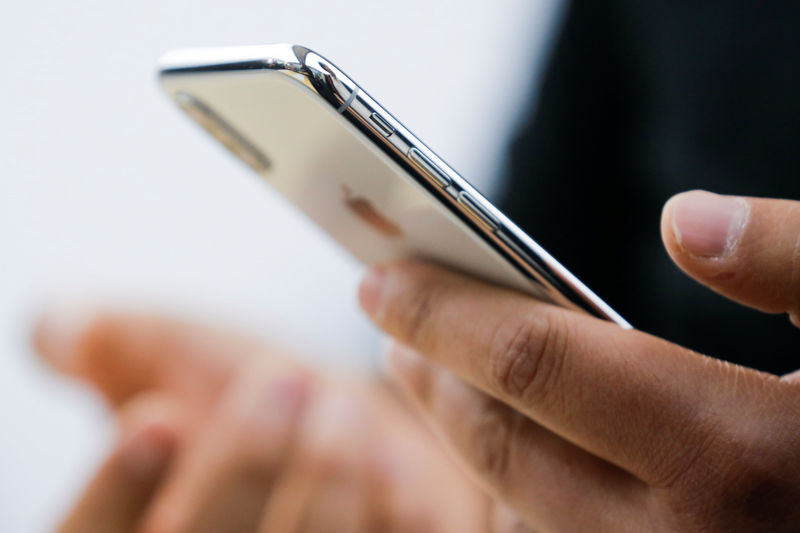JPMorgan’s Dimon weighs in on potential Fed chair candidates
Investing.com -- Apple fell double digits in the first quarter as concerns about weak iPhone demand and regulatory headwinds weighed, but some on Wall Street suggest taking a closer look at the stock as the slump has dragged its value well below historical averages and its fundamental business model remains intact.
"We are more constructive on Apple," analysts at Bernstein said in Thursday note, highlighting the stock's underperformance following the slump year-to-date and poor investor sentiment. "Our belief that its fundamental business and financial model are intact," the analysts added.
Apple Inc (NASDAQ:AAPL) fell 11% in Q1, pushing its valuation to well below five-year averages, and the stock is trading at about 24 times next year's earnings, which is not a "terrible price to pay," Bernstein said.
Slowing iPhone sales, particular in China, has proved fertile ground for bearish bets and added to worries that Apple's business in maturing. But the release of the iPhone 16, expected to be equipped with artificial intelligence, could spark a strong upgrade cycle.
While AI powered smartphones aren't new and Apple may behind the curve, history shows that the iPhone maker doesn't need to be first nor convince Andriod users to switch, but rather persuade its existing 1.2M iPhone users to upgrade.
"When Apple does well and has a good cycle, it's because more people are replacing their phones. It's not because they're getting a lot more switchers from Android, necessarily, or they're getting a lot of new users," the analysts said.
Still, the bears would argue that hopes of a new iPhone leading to a super upgrade cycle have previously fallen short, leaving plenty room for skepticism on whether an AI-powered iPhone will have enough razzle dazzle to spur upgrades.
Margin-rich services story remains in intact
But slowing or stagnant iPhone sales is hardly news. . .
iPhone sales reached 230 million units in 2015, has been around that level ever since. During this period of maturing iPhone sales, Apple has, however, continued to churn out double digit earnings growth.
This suggests that solely focusing on Apple's iPhone sales risks loosing sight of the fundamental driver of growth: services.
Services is a key part of the growth driver, led by the App store and licensing fees, which are payments from Google (NASDAQ:GOOGL), and advertising, collectively is over 50% of Apple services revenues and it's more than 60% of the gross profits, Bernstein estimates.
Significant regulatory headwinds -- still a long way to go
Apple's App store practices, however, have come under scrutiny not least in Europe, where a sweeping new law, the Digital Markets Act, has given lawmakers extra clout to go after big tech and force them to open up their platforms to allow users more choice.
But App store revenue in Europe makes a just a meagre 7% slice of global App store revenue, and just 1% of Apple's revenue. The bigger risk is if those same regulatory headwinds appear in the U.S., but for now the Department of Justice's case in the US is much "more about trying to open Apple up," Bernstein argues.
There doesn't appear to be "any direct legislation either on advertising or on the App Store," the two big profit drivers in the services business, likely keeping this key growth engine intact.
